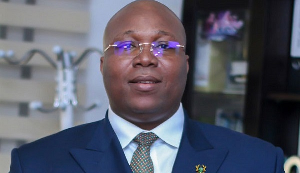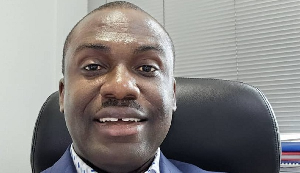The reported ‘fraudulent’ deals at UT Bank, which contributed to its total collapse last year, are beginning to unravel, as one of the major debtors, Ibrahim Mahama, scurries for cover over his role.
UT Bank alone is said to have been given over GH¢860 million by the Bank of Ghana (BoG) as lifeline but still couldn’t survive the mounting bad loans granted to its customers which culminated in its final collapse.
Ibrahim Factor
According to a leaked report of the team commissioned by the Bank of Ghana (BoG) to investigate the collapsed UT and Capital Banks, the UT Bank, which was a listed company on the Ghana Stock Exchange (GSE), was heavily indebted, as companies belonging to Ibrahim Mahama, junior brother of former President John Mahama, owed over GH¢300 million, which was not repaid.
The report, which was submitted to the Banking Supervision Department (BSD) of the Central Bank by Boulders Advisors Limited (BAL), in January 2018, listed Dzata Cement, Holman Brothers Ltd, MBG Ltd and Engineers and Planners as companies owned by Ibrahim Mahama, which took loans from UT Bank but could not repay them to the bank.
Dzata Cement alone was said to have received GH¢131.5m from UT Bank while the rest of the four companies reportedly received GH¢261.4m from the collapsed bank managed by Prince Kofi Amoabeng.
Ibrahim Counter-Attack
Ibrahim Mahama has mounted a swift counter-attack, saying he did no wrong because the loans he acquired for his businesses were ‘over-collateralized.’
He sent journalists to tour the said Dzata Cement over the weekend and said the facility was 80 percent complete.
Interestingly, Dzata Cement, a bagging cement company’s component of the loan, was less than half of the over GH¢300 million facility advanced to Ibrahim’s companies.
One of his lawyers, Reindorf Twumasi, in a statement issued on behalf of Ibrahim Mahama later, said “the sum of money put out there as the amount owed by companies ‘owned’ by Ibrahim Mahama is not accurate and not a reflection of the facts and documents.
He appeared to be saying that the whole report was skewed.
“It was agreed that UT Bank will finance the cement factory till it becomes operational but this unfortunately could not happen due to the revocation of its licence last year. At the time the bank’s licence was revoked, the records will show that the project was about 80 percent complete. Due to the unexpected revocation or the bank’s licence Dzata had to resort to other financiers for support to complete the project. In February 2018, Government of Ghana gave the Cement company clearance to import 1.2 million metric tonnes of bulk cement for re-bagging based on evidence of installed bagging plant,” the lawyer said.
However, according to the report, UT tried fruitlessly to recoup the loan facility advanced to Ibrahim without success leading to its eventual collapse.
This is not the first time Ibrahim has contributed to the collapse of a local bank, as Merchant Bank went under due to Ibrahim’s failure to settle the debts.
Ibrahim’s lawyer stated: “It must also be noted that Mr. Ibrahim Mahama did not contribute in any way towards the ‘collapse’ of UT Bank. The evidence available to the bank will show clearly that the loans taken by Dzata Cement were over collateralized. The report purportedly making the rounds in the media may have been skewed or misrepresents the facts and therefore should be dismissed.”
Amoabeng’s Angle
Already, Prince Kofi Amoabeng, the businessman, who set up then vibrant Unique Trust Financial Services, which later became UT Bank, has come under public scrutiny over the role he might have played in the total collapse of the bank.
The report said Mr. Amoabeng did not disclose the receipt of some GH¢5 million paid to him by Kofi Jobs Limited believed to be one of the companies linked to Ibrahim Mahama, which happens to be a debtor of the bank.
This was after the bank authorised an advance payment guarantee from Engineers and Planners, which settled Kofi Job Ltd’s indebtedness to the bank.
House Deal
Mr. Amoabeng, according to the bank, however, explained that he sold his house to Mr. Kofi Jobs Gyebi, hence the payment of that GH¢5 million to him.
The report further said Mr. Amoabeng also breached ‘single obligor’ limits for Ibrahim Mahama’s connected companies of Holman Brothers, Kofi Jobs, Dzata Cement, MBG Limited and Engineers & Planners Limited.
The single obligor limit, according to the report, is the maximum amount a bank is allowed to lend a single borrower or an individual in relation to the total shareholders’ fund of that bank.
For instance, Mr. Amoabeng, who exited UT Bank, extended additional credit to Holman Brothers by pledging a $5 million placement as collateral security with Beige Savings and Loans to extend a $5 million loan to Holman Brothers during his tenure.
UT Holdings
The report said Mr. Amoabeng as UT Bank boss consistently signed investment placement deals on behalf of both the UT Bank and UT Holdings, explaining “several deposit investments were placed with UT Holdings Limited and not recorded as liabilities and assets on the UT Bank’s books.”
This was evidenced by minutes of the 1st ordinary meeting of the bank’s board for 2016, which said: “Payments of up to GHS6.9 million for matured fixed deposits were made to customers who claimed to have had investments with the bank. Even though these deposits could not be traced in the system, payments were made following internal audit investigations. There is an urgent need to address this growing account balance.”
Inter-Group Lending
The team also found out that there was a significant amount of inter-group lending involving other subsidiaries of the holding company, UT Holdings of GH¢71.6 million and $14.3 million and the connected party loans were made to Ibrahim Mahama’s related companies, amounting to GH¢261.4 million and $6.4 million, Quincy Sintim’s related companies amounting to GH¢84.1 million, and Beige Group’s related companies, amounting to GH¢10.9 million.
“The bank sought a waiver of the Ibrahim Mahama related companies’ single obligor violations by the bank, yet undertook a pass through $6.4 million transaction by giving Beige Capital Savings and Loans a $5m placement as guarantee for Beige to extend a $5 million loan to Holman Brothers.”
UT Bank, at an emergency meeting, according to the report, expressed concern about Ibrahim Mahama’s inability to meet his obligations to the bank on May 20, 2016 and said he made no effort to honour any of the assurances he gave when he met UT Bank on 29th March, 2016 although as at May 2016 his total exposure was approximately GH¢302 million.
“The board requested a meeting to be arranged between the board chairman, Mr. P.K. Amoabeng on one hand, and President Mahama, Mr. Ibrahim Mahama and Mrs. Mona Quartey, on the other, to discuss the way forward,” adding “the board met with Mr. Adi-Ayitevi as representing Mr. Ibrahim Mahama. The board expressed its disappointment with Mr. Ibrahim Mahama; its members felt slighted and disrespected by his actions and questioned his credibility as a businessman.”
Ibrahim begs
The report stated that at the emergency board of directors’ meeting on 3rd June 2016, Ibrahim Mahama met the board to discuss his non-performing loans.
At this meeting, Mr. Mahama indicated that he was making every effort to pay the amounts outstanding from related companies.
He, however, asked that the bank should grant an advanced payment guarantee (“APG”) of GH¢28.6m to enable Kofi Jobs mobilize funds for projects.













